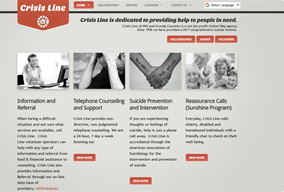
The recent suicides of celebrity fashion designer Kate Spade and celebrity chef and CNN host Anthony Bourdain have brought about much worry about copycat behavior among those who might be considering suicide. Will County Health Department Behavioral Health Director Dr. Joseph Troiani says this concern is very legitimate.
“Any time you have a high profile suicide, there is always the chance that it could nudge someone who has been thinking about hurting themselves to take action. It’s very similar to when a suicide happens in a school, and there is always fear that other kids hearing about it might then consider similar behavior.”
Dr. Troiani says the number one key factor is to get people talking about all of this, and then KEEP them talking and understanding the issues better. “With Spade and Bourdain, for example, it was very similar to Robin Williams’ situation” (Williams died of a suicide hanging in 2014).
“All three of them,” Dr. Troiani continued, “had fought alcohol or substance use problems during their adult lives. And as we know, this has come into play with celebrities many times before. As you get older, and you have this in your background, one can become a ‘high-risk’ for suicidal behavior.”
Dr. Troiani pointed out that what is really disturbing about the future is when you add these “copycat” tendencies and celebrity troubles on top of today’s often talked about “Millennial” generation. “It has been said that Millennials are the ‘most anxious’ of all recent generations. This could mean anything from free flowing anxiety about everything to specific worries. And when you add to the puzzle self-medication behavior such as alcohol and substance abuse, you are literally throwing gasoline on the fire.”
Then, there is the constant concern about Veterans, another group that is now partly made up of Millennials. “Public health officials list suicide as the 10th leading cause of death in the United States,” Dr. Troiani explained, “and about 22 to 23 percent of the victims are Veterans. And we do not mean just aging Veterans. A lot of Millennials served overseas in Afghanistan and Iraq, saw some very disturbing things, and still fight that mental battle every day.”
The number one point in all of this, Dr. Troiani says, is that there is help out there. And it comes in two stages. First, friends and family who have had contact with someone who might be suicidal. And second, where those with suicidal thoughts, or their family and friends, can turn to for help.
“We need to absolutely get rid of the ‘no talk rule,’” Dr. Troiani said. “It is important to not ignore problems we are fighting ourselves, and also not to ignore what someone else says. We cannot have any of this ‘well I didn’t take it seriously, we just never talked about it.’ When something is wrong, we need to take action and get help.”
The Will County Health Department’s Behavioral Health Division can be reached at 815-727-8521 to seek help for anyone facing suicidal thoughts. There is also the Screening, Assessment, and Support Services (SASS) hotline to report a child or adolescent with difficulties, at 800-345-9049.
The Health Department also contracts with the Will and Grundy County Crisis Line for after-hours service. They can be reached at 815-722-3344. More information about the Crisis Line can be found at http://crisisline247.org/.
More information about Will County Health Department Behavioral Health services can be found at willcountyhealth.org.

